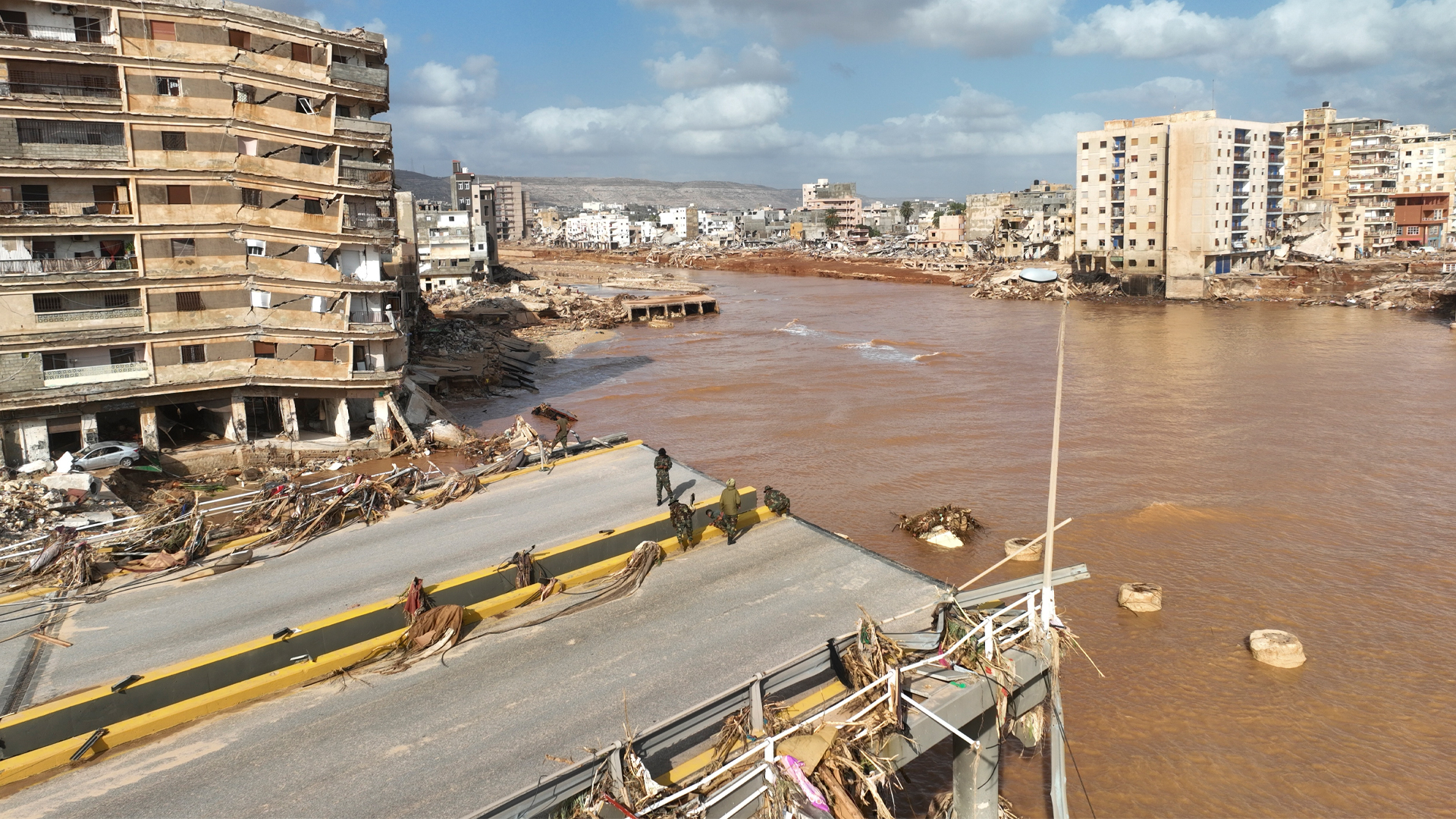
When considering security crises in 2023, the top item on the list of most Canadian policymakers and observers is likely Russia’s invasion of Ukraine. Western governments have responded with concerted military and humanitarian support, sanctions and contributions to reconstruction efforts.
The speed and scale of that response is in stark contrast to the lacklustre reaction to other crises our world faces, particularly climate change.
As the Earth heats up to unprecedented levels, with devastating consequences for people across the globe, the danger of relegating this other crucial issue to a secondary status is growing.
Not only do we risk failing to hit the 2015 Paris agreement target to keep the increase in global temperatures to 1.5 C above pre-industrial levels – a threshold which itself threatens lives and livelihoods – but continued inaction will further fracture international relations.
In this summer marked by record wildfires and floods, global tensions are increasing. But the climate crisis cannot be tackled within the silos of borders. It requires global co-operation.
Climate change is geopolitical. Countless wars have been fought for oil, gas and coal. Extreme weather events – such as deadly heatwaves, floods and fires – as well as longer-term climate degradation – such as droughts and rising sea levels – are happening with increased frequency and intensity.
The economic dimensions of a changing climate – the consequences of dealing with harsher and more common natural disasters, the cost of inaction and the massive transformation underway to align the global economy with the Paris goals – are amplifying inequities across nations in ways that governments are just beginning to comprehend.
The Paris Agreement goals – and the transition away from fossil fuels that is necessary to get us there – cannot happen without a massive increase in funding to fight climate change, as well as changes in how the international finance system operates.
Countries from the Global South are disproportionately affected by climate change impacts. They also face various development challenges and very different fiscal contexts than the Global North.
G7 nations are responsible for the largest share of historical emissions. They also possess a greater capacity to cover the cost of climate action.
To limit warming to 1.5 C, countries agreed in Paris that all would bend their greenhouse gas emissions curve according to a “common but differentiated responsibility” and that rich countries would provide the resources to make this possible.
But countries from the Global North have not held up their end of the bargain. In 2009, in Copenhagen, rich countries committed to mobilizing at least US$100 billion per year by 2020 through 2025.
The money was to help countries of the Global South mitigate and adapt to the growing effects of climate change. This amount pales in comparison to the needs, which the World Bank estimates at US$2 trillion annually. Even so, this much more modest commitment has not been met.
With the fiscal impacts of the COVID-19 pandemic still lingering, countries in the Global South are faced with an escalating debt crisis, which is compounded by the climate crisis. Fifty-two countries are dangerously close to or in default on their debts.
Developing economies also face unfair and unfavourable financing costs to transition away from fossil fuels, and to adapt to and recover from climate-induced disasters.
While the Global North borrows at rates ranging from one to four per cent, the Global South faces interest rates of around 14 per cent as Mia Mottley, the prime minister of Barbados and leader of the Bridgetown Initiative, has noted.
These heavily indebted countries are trapped into investing in fossil fuels by multilateral development banks or financial institutions in the Global North to generate oil and gas revenue that often does not materialize.
Meanwhile, in the Global North, resources and attention are being poured inward – which is necessary but insufficient when it comes to climate change. Countries are becoming increasingly insular as they jockey to reap the job and investment benefits of a “net-zero economy,” a development which exacerbates tensions with other countries.
In Washington, the Biden administration’s new doctrine – a “foreign policy for the middle class” – seeks to simultaneously decarbonize, disentangle from China and Russia, and deliver a more equitable economy.
Its groundbreaking Inflation Reduction Act promises at least US$369 billion in climate investments – including incentives for the wind, solar and geothermal industries, batteries, heat pumps and more.
But when it comes to putting money on the table and contributing its fair share of international climate finance, the U.S. is missing in action. The U.S. continues to dodge the enormous responsibility it holds for the vast majority of the world’s pollution.
Trust is eroding without this promised money on the table, and as countries with disproportionate historical responsibility for the climate crisis continue to put literal fuel on the fire by expanding fossil fuels. At the Bonn Climate Conference in June, the resulting tension was palpable – and the talks ended in an impasse.
Overhaul of international financial governance needed
Worldwide, scaling up renewable energy massively and phasing out fossil fuels through a just energy transition will be achieved only through the overhaul of global financial governance.
Where does this leave Canada? If it is serious about the climate crisis, engaging proactively to repair these global fractures should be a priority. But Prime Minister Justin Trudeau sent the opposite signal by his absence at a finance summit on the subject that took place in Paris in June where leaders from the Global South came to propose solutions.
So far, Canada and its G7 allies have been slow to show interest in transforming global institutions to reflect the needs of a multipolar world in an era of converging crises.
The Bretton Woods system created after the Second World War still represents the interests and the distribution of power of that era. This is notably reflected by U.S. dollar dominance and the G7-dominated voting shares, leadership and resulting priorities and actions at the World Bank and the International Monetary Fund.
What is needed is a massive global program to provide concessional finance for climate mitigation, adaptation, loss and damage – a Marshall Plan of sorts, but rooted in the Global North countries doing their fair share to solve a problem they caused, and with governance rooted in genuine partnership.
As Mottley put it so clearly: “The world cannot continue in the shadow of an old imperial order that does not see countries, does not feel countries, does not hear countries, and worse – does not see people.”
Achieving this level of transformation will require the Global North taking steps to build bridges and support demands from the Global South, and for some Global North countries to play broker to avoid the escalatory dynamics of great power competition.
This is something Canada can take on in environmental diplomacy. The historic collaboration between Environment and Climate Change Minister Steven Guilbeault and his Chinese counterpart Huang Runqiu during the recent COP15 in Montreal, despite rising tensions with China, and the resulting Kunming-Montreal Global Biodiversity Framework is one example.
There will be other opportunities in the coming months, notably the upcoming United Nations General Assembly and COP28. To effectively rebuild trust, however, Canada must match its actions to its words on phasing out all fossil fuels, address the fiscal concerns of Global South countries, and champion climate finance reform, especially for adaptation and loss and damage.
Tackling the climate crisis at the speed and scale which is needed now requires a whole-of-government approach – one that includes coherent foreign policy and the country’s full diplomatic apparatus.
“Polycrisis” requires multipronged solution
The framing of “great power competition” – a zero-sum contest between the U.S. and China – will not respond adequately to the current convergence of crises. In an interconnected world facing interconnected issues, what is needed is co-ordination across sectors and polities rather than additional competition.
Green industrial strategy is absolutely necessary, but an approach centred only on domestic issues runs the risk of aggravating geopolitical fault lines and being ineffective to limit warming to 1.5 C if the energy transition simply reproduces and exacerbates the international order’s inequity.
Brazilian President and BRICS founder Lula da Silva perhaps summarized this best: “We cannot accept a green neocolonialism that imposes trade barriers and protectionist policies under the pretext of protecting the environment.”
As a middle power, Canada is also not advantaged in a world characterized by great powers fighting. As my former professor Kishore Mahbubani, who was Singapore’s United Nations representative, used to say: when elephants fight, the grass always gets trampled.
With wildfires raging across the country all summer, it’s also clear that Canada cannot afford to focus only on what’s happening within our borders, or those of our traditional close allies. Climate change is a global crisis that requires global solutions – one that can allow us to build, if the response is right, a more just international system.
This article is part of a series on the future of Canadian foreign policy.
Also in the series:
- Walter Kemp on the need for a policy review
- Louise Blais on how Canadian foreign policy has gone wrong
- Zachary Paikin on middle power status and a new northward direction
- Andrew Latham on redefining Canada’s core interests
- Jeremy Paltiel on a new Indo-Pacific strategy









